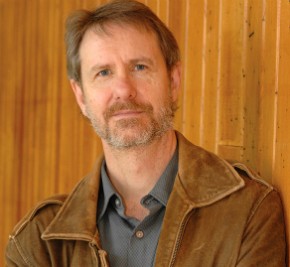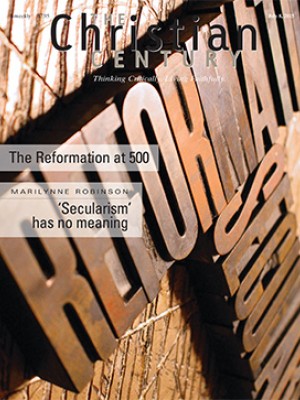Countering the darkness: Fiction writer Ron Rash

As a poet, novelist, and short story writer, Ron Rash tells haunting tales of the American South, particularly of the North Carolina and Tennessee mountains. While his stories are stark, they hint at larger mysteries and marvel at the human capacity for wonder in the midst of suffering. His most recent collection of stories is Something Rich and Strange (see Frykholm's review).
Your stories often exist on the border between realism and wonder. Do you think of yourself as a realist writer?
I am commenting on real conditions, both past and present, not so much as an advocate, but as a witness. That’s the way I hope my work comes across. Yet wonder is a part of human reality as well.
What inspired your first story?
Unlike a lot of my writer friends who started writing early, I didn’t try it out until I was in college. The first story was about my uncle, a man who had come to a serious time in his life, who had lost his family and his job.
Some of your stories are breathtaking in their violence, and yet the overall effect is not depressing. How is that?
In fiction, as in real life, a person’s character is often best revealed in extreme situations. If people read me to be titillated by violence, then I have failed, because violence is just a means to understand my characters better.
My hope is that the pleasure of the language helps counter the darkness. That’s what makes Cormac McCarthy’s works or a play like King Lear bearable. Even in the midst of darkness, something beautiful is being transmitted.
I believe that most of my characters do the best they can with the hands they’ve been dealt. I am not a cynic. I am not a nihilist. I hope I show characters that the readers can recognize as being human, even in extreme circumstances.
We’ve been talking about the realism of your work, but myth and archetype are also present.
I hope my work can be read on multiple levels. For example, Serena is a realistic novel depicting the North Carolina mountains during the Depression, but I was also hoping the reader would recognize a mythological level in it—references to Medea, for example. I am fascinated with Carl Jung’s idea of the collective unconscious and the idea that we share certain stories deep in our consciousness.
Read our latest issue or browse back issues.
Are there certain myths that you draw on often?
Yes, many of which are about people trying to leave their humanity behind them and the price of that to themselves and others, as in Serena.
What are some of the other big questions at work in your writing?
I am fascinated by the duality of human beings: the recognition of evil in the world but also the goodness. Evil always rises up. And yet there are always people who fight against it. I am fascinated by the war between what is best in our natures and what is worst.
I am also fascinated by the connection between the inner world of a person and that person’s environment. Living in these mountains can work in two ways. There is a sense of being protected by the mountains—almost womb-like; but they loom overhead and remind one of how small and fleeting human life is.
Do you go to church?
I go to a Presbyterian church. I grew up Southern Baptist. When I married my Presbyterian wife, I decided I would become a Presbyterian. I wrote to my Baptist church in North Carolina to release me, and they wouldn’t do it. So I am still a Baptist, at least on paper, I guess. The Presbyterians seem OK with it. They let me take communion. They don’t make me wear a scarlet B.
Church is important to me. I enjoy the quietness and the seriousness. I have always been a renegade in terms of orthodoxy. I am not a particularly good Presbyterian or a good Baptist. Probably the only statement I am comfortable in making about my relationship to religion is that there is something in me that yearns for transcendence. I have my doubts, plenty of them, but belief always seems to win out.
Is there a story or novel that best expresses or reflects your own faith?
The novel I just finished is about wonder. It is by far my most positive book. It is about the beauty of the world and our need to acknowledge it. But I would hope that the reader finds moments of wonder and transcendence in my other works.







